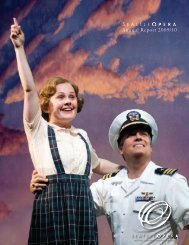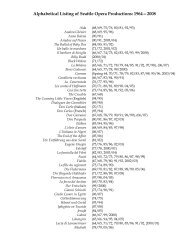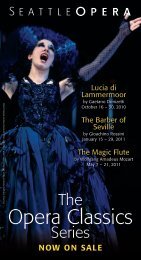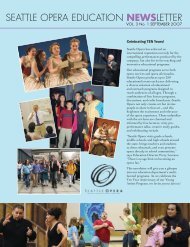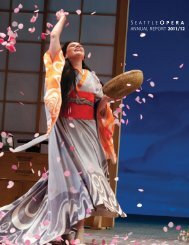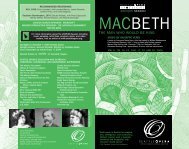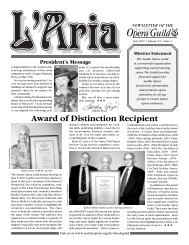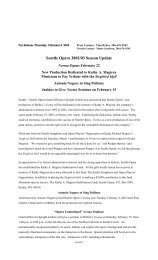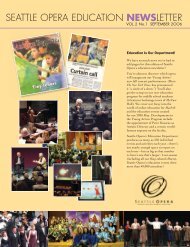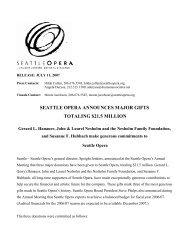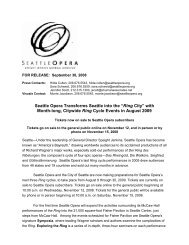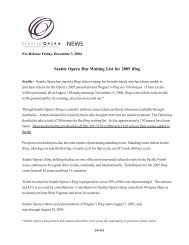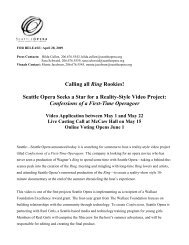Create successful ePaper yourself
Turn your PDF publications into a flip-book with our unique Google optimized e-Paper software.
Aria Ready?<br />
Nuccia Focile, Elle<br />
A woman is trying to stay connected<br />
to her lover on the telephone.<br />
Ron Scherl photo<br />
Tristram Kenton photo<br />
Poulenc’s Dialogues of the Carmelites at <strong>Seattle</strong> <strong>Opera</strong> in 1990<br />
La voix humaine was written partly in response lotine, Dialogues was a big hit at its 1957 La<br />
to a complaint from an actress that his scripts Scala premiere, and was quickly performed by<br />
were so pre-determined by writer and director opera companies in London, Paris, Vienna, and<br />
there wasn’t much in them for actors to do. La San Francisco. <strong>Seattle</strong> <strong>Opera</strong> first produced it in<br />
voix humaine continues to be produced as a play 1990. Poulenc wrote La voix humaine immediately<br />
following Dialogues, for the soprano Denise<br />
all over the world.<br />
Duval. Cocteau’s play provided suitable inspiration<br />
for a witty man who loved dogs and had<br />
Poulenc may not have broken as much new<br />
ground as some twentieth-century composers of<br />
a history of unstable relationships and abusing<br />
classical music, but audiences have always taken<br />
sleeping pills.<br />
to his work. He expressed in music both the<br />
smiling, eager-to-please side of his personality,<br />
Donna Abbandonata<br />
and also his deep insecurities: his hypochondria,<br />
need for love, and quest for faith. A prolific<br />
La voix humaine is technically a “monodrama,”<br />
composer of songs, he also wrote much religious<br />
an opera for only one character. Another such<br />
music, some popular chamber music, but no<br />
piece, Schoenberg’s Erwartung, was produced in<br />
symphonies—although orchestras sometimes<br />
2009 at <strong>Seattle</strong> <strong>Opera</strong>. Like Erwartung, La voix<br />
play the suites made from his ballets Les Biches<br />
humaine is a tour-de-force for a solo soprano,<br />
and Les Animaux modèles, concertos, and other<br />
whose character must come to terms with the<br />
works. The BBC commissioned his History of<br />
end of a relationship.<br />
Babar the Elephant for piano and narrator, a It turns out that this kind of piece has a long and<br />
typically crowd-pleasing collection of vignettes proud tradition going back to the earliest days of<br />
based on a children’s book.<br />
opera. In fact, one of opera’s very first subjects,<br />
Poulenc wrote three operas. Les Mamelles de<br />
set by Monteverdi, was Ariadne abandoned by<br />
Tirésias is a gender-bending comedy based on<br />
Theseus on the island of Naxos. Other abandoned<br />
a surreal text by Guillaume Apollinaire, another<br />
heroines who have inspired opera composers for<br />
colorful character whom Poulenc had known<br />
centuries include Virgil’s Dido and Tasso’s Armida.<br />
briefly during World War I. Poulenc’s masterpiece,<br />
Dialogues of the Carmelites, was written island, the woman in La voix humaine may<br />
Unlike Ariadne, marooned on her desert<br />
in the 1950s. The story of a timid French girl be abandoned, but she’s hardly alone, given<br />
who, during the French Revolution, overcomes all the people chattering away on her telephone<br />
her fear of death and goes boldly to the guil- line.<br />
SO: You are the only person onstage<br />
during this opera, so you are, in a<br />
sense, singing one long aria. What<br />
is challenging about being onstage<br />
by yourself for 40 minutes?<br />
NF: You really have to carry the whole show<br />
on your shoulders. The entire story is<br />
based around this telephone, which<br />
connects this woman to everybody else<br />
involved in the story. I have to act my<br />
role, but I also have to act everybody<br />
else because the only way for the<br />
audience to understand and imagine<br />
what the other person is saying to me<br />
is through the expression on my face.<br />
The voice is really dictating everything,<br />
which is why there must be such a big<br />
understanding between the conductor,<br />
the director, and the singer. Sometimes,<br />
for example, the music cannot start until<br />
I do a particular movement or reaction,<br />
and that reaction happens in the silence.<br />
It doesn’t always take the same amount<br />
of time. Evenings can be shorter, some<br />
can be longer. I have to find courage<br />
to sustain those moments of silence. It<br />
really is more like a play than an opera.<br />
SO: Have you actually scripted what the<br />
people on the other line are saying?<br />
NF: I have my phrases in my mind, so I know<br />
exactly how to react to it.<br />
SO: Have you performed this role before?<br />
NF: I performed this role last year in Covent<br />
Garden in London in English. In <strong>Seattle</strong>,<br />
we will do it in French, so in a way it will<br />
be like doing it for the first time. When<br />
you sing it in French, it becomes more<br />
elegant, lighter. The language and the<br />
music are so perfect together.<br />
2012/13 Season at <strong>Seattle</strong> <strong>Opera</strong> 29



